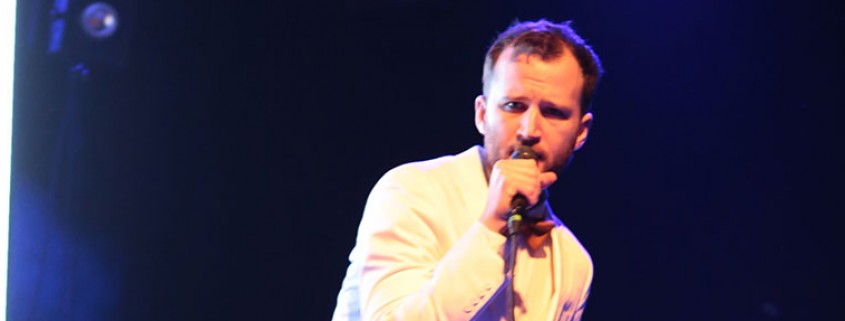Q&A: Vampire Weekend Bassist Chris Baio
A full house awaited the performance of Vampire Weekend’s bassist Chris Baio at the El Rey Theatre on Thursday evening as he kicked off his North American tour with a debut of his recent album, The Names. Released last fall, the album features an array of eclectic electro-pop tracks much different from what Vampire Weekend fans are used to hearing.Baio’s tour marks the use of integrated visual graphics to supplement his tracks, a feature that led audience members to roar with excitement.
The show included opening performances from DJ Marion Hodges, Michl and Elohim. Michl was the first to walk onstage to perform three unreleased tracks and one popular track titled “Kill Our Way to Heaven,” released only three months ago on SoundCloud with over already 1.2 million hits. Fans described this track as smooth, powerful, reserved and hauntingly beautiful, a clearly shared sentiment among audience members. Elohim, too, performed four tracks including, “Pigments,” “Xanax,” “She Talks Too Much” and “Bridge and the Wall,” without ever showing her face on the stage. Known for keeping her identity hidden so that fans can listen to her music without any distractions, Elohim brought a great deal of energy to the crowd — a perfect transition into Baio’s set.
Baio, a native to New York, moved to London in the summer of 2013, a dramatic transition that granted him the inspiration for his new album. Still very much an active member of Vampire Weekend, Baio has been able to pursue his own passion for deejaying by creating independent electronic tracks that feature a sense of an ongoing restlessness. The album flows continuously. Thursday’s show featured some of The Names’ hottest hits such as “Sister of Pearl,” “Endless Rhythm” and “Brainwash Yyrr Face.”
In an interview with the Daily Trojan, Baio discussed the driving forces toward his music and what he looks forward to on tour.
Daily Trojan: What do you expect from the North American tour and what are you most looking forward to?
Chris Baio: For me, touring and playing live is like the reward after making a record. So far, there has kind of been a lot of starts and stops … right now, it’s the start of about six to seven weeks of solid touring. This record is something I’ve been thinking about for a really long time — even going back to 2009. I finished it by the end of 2014, and in a way it was my little secret — this thing I had to exorcise from my head, and now getting to play every night to a crowd makes it real to me.
DT: What was your inspiration for The Names?
CB: I moved from New York, where I had lived my whole life, to London in the summer of 2013, and I guess I found that it was really inspiring for me when it came to writing lyrics and sort of thinking of identity. I had a new kind of perspective to look back on my life up to that point, and a new life to be excited by. That’s where a lot of the lyrics came from. There’s a song called “Endless Rhythm,” and a lot of that is about living in London and what it’s like to live in the city and even something as simple as the relationship between people and the ground and sky.
DT: How is The Names different from your other albums such as Sunburn?
CB: What was new with this record was using my voice and trying to sing and write lyrics and vocal hooks. I found that I really enjoyed it, but it was definitely the most challenging part of the record.
DT: Is it difficult to transition yourself from being the bassist for Vampire Weekend to working as an independent producer? What are some of the challenges you face shifting gears from bassist to producer?
CB: I think the dynamic of deejaying versus playing in a band, is all about the social contract of the performer. When you play in a band, there’s a social contract that people will buy tickets and come see you play and you’ll play songs that they know in some fashion, but when you DJ, it’s not as clear. And, I think as a result there is the opportunity for people going to see you DJ to be really disappointed and angry at you. It’s something that I think helped me develop a thicker skin as an artist.
DT: What advice do you have for young aspiring producers graduating from college trying to make it big in the music industry?
CB: Listen to a song that you don’t like and be able to identify an element or a sound that you do like, be able to separate the different sounds from the songs, and if you can isolate something that you like from something that you don’t like, I think that goes a long way to knowing what you wanna be and who you want to be as a producer.

